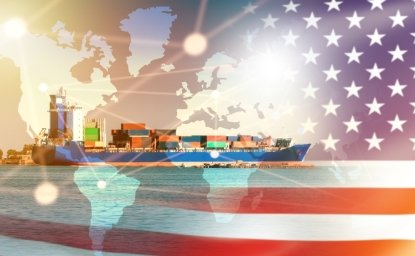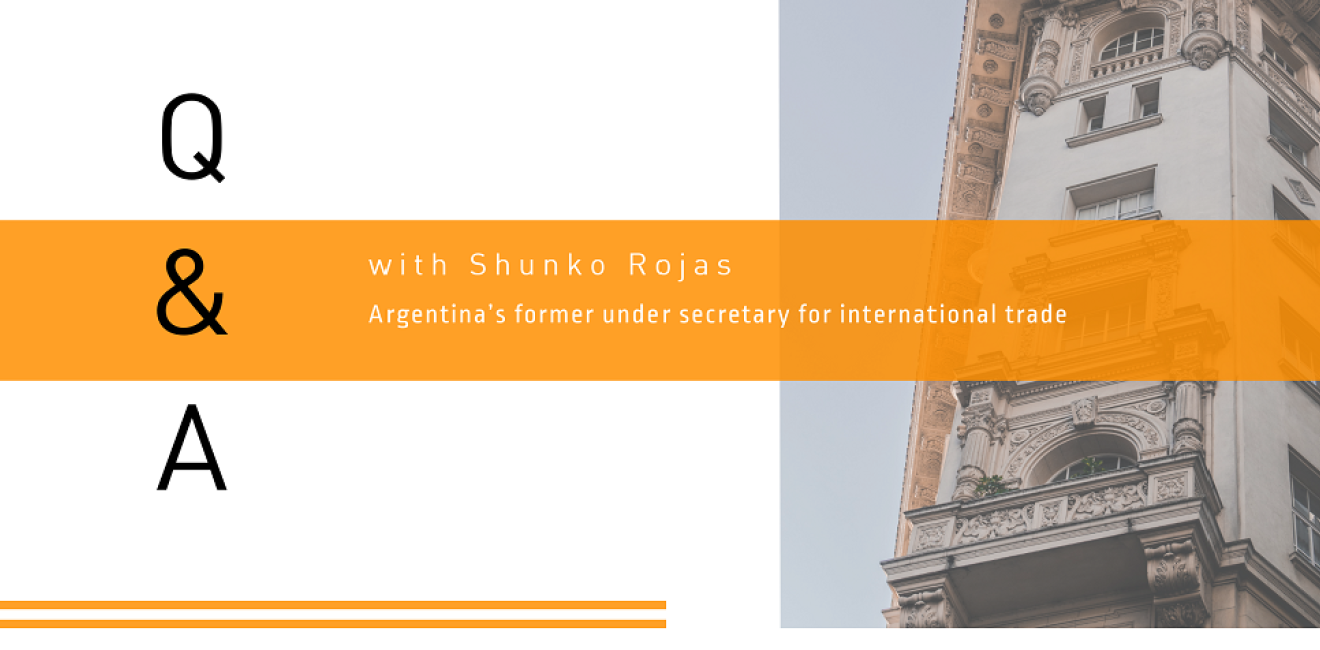Q: The free trade agreement between Mercosur and the European Union was under negotiation for twenty years, yet failed to gain traction until now. For the Europeans, one goal was to send a strong signal in favor of rules-based trade at a time of growing protectionism, including in the United States. What changed in South America? Why were Argentine President Mauricio Macri and Brazilian President Jair Bolsonaro able to seal the deal, while their predecessors were unable or unwilling? What role did you play in the negotiations when you served as Argentina’s undersecretary for international trade?
A: The start of President Macri’s presidency in Argentina, in 2015, represented a historic turning point on trade policy, not only for the country but also for Mercosur. Regarding the agreement with the EU, the personal involvement of President Macri during key periods in the negotiations was fundamental. If it hadn’t been for his vision, commitment, determination and action, the agreement would not have been possible. It was also necessary for President Jair Bolsonaro to take office in Brazil to advance with conviction an open trade agenda and overcome some of the political economy difficulties faced by Brazil’s previous interim government. In addition, on the European side, the EU’s global trade leadership against protectionism, Brexit, and the forthcoming change in EU authorities created the necessary favorable conditions for closing the deal.
I participated in Mercosur’s chief negotiators team, representing Argentina’s Ministry of Production. The successful conclusion of the agreement was the outcome of a long process and hard work behind the scenes. When we took office in 2015, we found out that, given the Argentina’s isolation during the previous administration, the government did not have the necessary institutional capabilities to intervene effectively in complex, intense and high-stakes trade negotiations. We had to build, almost from scratch, the negotiating teams, conduct studies and produce materials, develop inter-agency coordination, set up a mechanism for consultations and a “room next door” with the private sector, and define Argentine position on issues that had never been negotiated before, such as intellectual property, public procurement, e-commerce, sustainable development, among others. In addition, to resuscitate the negotiations with the EU that were dead in 2016, it was necessary first to deepen and improve our relationship with Brazil, our key trade and strategic partner, and bolster drastic changes and a new dynamic in Mercosur.
Q: If ratified, the FTA between these two trade blocs would be among the largest ever, but the asymmetry between the two regions is stark. Europe is at the forefront of a range of hi-tech industries. Meanwhile, Mercosur economies largely remain dependent on primary goods, and rely upon protectionist policies to defend their industrial sectors. In 2018, for example, manufactured goods made up just 20 percent of Argentina’s merchandise exports, compared to 81 percent for the EU, according to World Bank data. By gradually introducing greater foreign competition, do you think Argentine industry is up to the task of becoming more competitive? What are the main areas where Argentina needs to improve in order to become more competitive?
A: Examining the weight of manufactured goods in exports can sometimes be misleading. Not only because there are limitations in the proxies (agricultural exports, for example, may rely upon very advanced technology or reflect value-added processing), but also because they are not necessarily indicators of asymmetry in competitiveness. There are many examples of competitive countries – in some cases with even higher income than Argentina – with a share of manufactures in exports similar, or even lower, than that of Argentina, such as Australia, New Zealand, Russia, Chile and Colombia. The gradual introduction of foreign competition in Argentina can certainly help increase competitiveness. First, with more open markets, companies can have access to more competitive inputs (displacing current foreign suppliers from third markets), and induce companies to invest in improving the quality of their products and services to increase their general productivity.
The EU-Mercosur agreement offers sufficient time (up to 15 years from its entry into force) for those who will face greater competition to adapt and get ready to compete. It is important to put the terms in perspective. Think about how much the automotive or the electronic industries have been transformed in only the last five years, and try to imagine them in 20 years, with different business models, technologies, production networks and supply chains. Or vice versa, think about how our industries and markets looked in 1999, when the Mercosur-EU negotiations began: smart phones didn’t even exist!
I believe there are four major areas where it is critical to improve to increase Argentina’s competitiveness. First, we need to achieve basic macroeconomic stability, with fiscal soundness and control of inflation, to have greater security and be able to plan, and make, medium and long-term investments. Second, it is key to invest in trade logistics and infrastructure to connect better our production sites to global markets, value chains and consumption centers. Third, we must carry out a profound cultural change in our private sector, so that international trade becomes part of the DNA of our SMEs’ business strategies. They need to go global and grasp the opportunities beyond the domestic market. Finally, it is essential to invest in education, which is at the core of the competitiveness of trade in services, technology and the digital economy – the economy of the future.
One of the great comparative advantages of Argentina, in addition to its natural resources, is its human capital. However, in recent times, its level has fallen below OECD standards and needs to catch up. The country must, therefore, invest and improve its human capital to remain globally competitive and raise the country’s income levels.
Q: The immediate reaction in Argentina to the trade deal has taken a sharply partisan tone. Presidential candidate for Frente de Todos Alberto Fernández said the agreement “offers nothing to celebrate, but many reasons to worry,” and kirchnerista lawmaker Máximo Kirchner, Cristina Fernández de Kirchner’s son, argued the agreement was possible only because “Argentina and Brazil have presidents willing to put their own people on their knees.” Our ArgentinaPulse survey, in partnership with Poliarquía, found only 30 percent of kirchneristas favor FTAs, compared to 75 percent of Macri supporters. Do you think this is merely campaign rhetoric from Mr. Fernández, or is the trade deal at risk if there is a change in government following Argentina’s October elections?
A: Although there are certainly fewer voices in favor of a more open economy in the Kirchner camp, I have no doubt that Alberto Fernández’s remarks are campaign statements. Let’s not forget that Cristina Fernández de Kirchner’s own government pushed for the agreement with the EU at the time. In fact, in many areas, what was finalized agreed with the EU does not differ significantly from the offer presented by Mercosur in 2012.
Certainly a change in government in Argentina this year would make the passage through congress more cumbersome. However, I trust the agreement will eventually be ratified. First, because I believe that, even in a Fernández government, there would be supporters of the agreement. But even more importantly, because there will be several governors endorsing the agreement because its entry into force will have a very positive impact in their provinces. When negotiating the agreement, we took into account the eventual necessary political support for its ratification in congress, and we ended up obtaining important concessions from the EU for products with a high impact on Argentina’s regional economies. Finally, and also very important, it is likely the agreement will allow for bilateral entry into force; if Brazil ratifies the agreement but Argentina does not, there is an important risk of trade diversification, with Argentina losing part of its participation in the coveted Brazilian market – the main destination of Argentine exports. The Argentine Congress, thus, will also have great pressure from the private sector to approve the agreement.
Q: Argentina has one of the most protected markets in the world, so entering into an FTA with the EU could be a death knell for many firms if they are not properly prepared. As always, trade also offers opportunities, and not only for Argentina’s existing competitive agricultural producers. But the transition could be long and politically costly. If poorly handled, it could produce a backlash, as the United States saw in the 2016 election of trade skeptic Donald Trump. How should Argentina prepare itself for a radically new approach to trade? What lessons should it learn from other market liberalization experiences?
A: I think it is important to note, first, that nobody actually “dies” from a trade agreement. “Free Trade Agreements,” although they do liberalize and increase trade, are neither totally “free” nor only about traditional trade (in goods). They address many issues that have to do with standards and regulations that only indirectly relate to trade, such as intellectual property rights, government procurement, environment, services, etc. Second, for products to circulate freely and without tariffs, they must comply with multiple requirements, such as rules of origin, safety requirements, administrative and technical approvals, etc. The agreement also includes trade facilitation commitments to reduce and simplify many of the inevitable processes involved in international trade operations. In addition, the agreement has “escape clauses” that allow for effective and adequate responses, for example, against unforeseen and significant increases in imports that may put a sector at risk.
It is also important to bear in mind that the agreement is with the European Union – a developed, high-income market, and a market that, in some sectors, has high production costs as well. The risks of, for example, unfair competition or low-labor-cost competition by European producers are actually low. In addition, many European products have export prices higher than their average in Argentina, so they will end up competing mostly in the higher ends of the market. Argentina has studied how trade adjustment programs have worked in other countries, such asin the U.S. and South Korea, and there are important lessons to be taken into account. In fact, the agreement with the EU has an important component on cooperation that can play a significant role in facilitating trade adjustments and securing the necessary political support for the agreement.
Undoubtedly, there are many lessons that we can draw from the conclusion of the agreement – let’s bear in mind, it is the first comprehensive, modern trade agreement signed by Mercosur. There are lessons for Argentina and for Mercosur. In addition to improving the systemic competitiveness of our economies, it is important to have a smart strategy of insertion into the world with clear objectives and implemented in a practical way, especially in a context that is increasingly gloomy, uncertain and polarized. In addition, Mercosur must continue its modernization process to be a more dynamic integration mechanism and serve as a platform for the internationalization and greater competitiveness of its members. Argentina, for its part, both in the government and in the private sector, must continue investing in strengthening its international trade capabilities to be competitive and take advantage of existing and future opportunities in an increasingly complex and changing world.
Author


Argentina Project
The Argentina Project is the premier institution for policy-relevant research on politics and economics in Argentina. Read more


Latin America Program
The Wilson Center’s prestigious Latin America Program provides non-partisan expertise to a broad community of decision makers in the United States and Latin America on critical policy issues facing the Hemisphere. The Program provides insightful and actionable research for policymakers, private sector leaders, journalists, and public intellectuals in the United States and Latin America. To bridge the gap between scholarship and policy action, it fosters new inquiry, sponsors high-level public and private meetings among multiple stakeholders, and explores policy options to improve outcomes for citizens throughout the Americas. Drawing on the Wilson Center’s strength as the nation’s key non-partisan policy forum, the Program serves as a trusted source of analysis and a vital point of contact between the worlds of scholarship and action. Read more

Explore More
Browse Insights & Analysis
Understanding Trade Promotion Authority (TPA): Implications for US Trade

The Innovative Landscape of African Sovereign Wealth Funds


